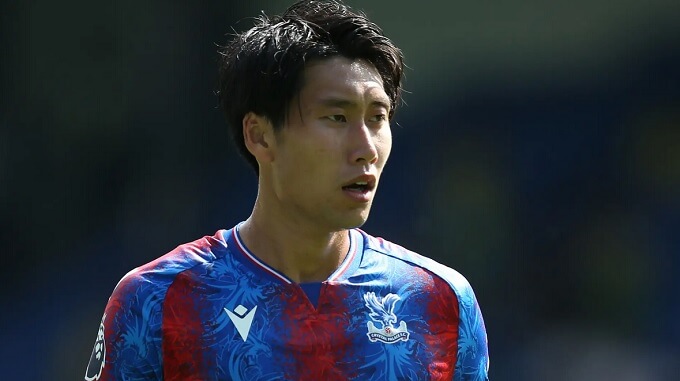- Top
- Entertainment
- Daichi Kamada's early life and childhood
Daichi Kamada's early life, childhood and career in Japan
Daichi fell into a clumsy condition in U15
Daichi Kamada(鎌田 大地 in kanji) was born in Ehime, Japan, in 1996. His parents named him after Daichi Suzuki, a gold medalist in the 100-meter backstroke, in the hopes that he would become a world-class athlete. Daichi began playing soccer at the age of 3 under the influence of his father. His father Mikio played soccer until college, and was known as a hard-hitting defender in high school and college, earning him the nickname "Tottori no Tora" (the Tiger of Tottori).
However, his father wanted his child to learn skills, as he himself was a physical-oriented player. He looked for a team that would teach Daichi some skills, and decided to put him in Kids FC in Ehime Prefecture. The team had an age-appropriate teaching method, such as using a ball in a game like tag for the little ones. The team's policy was to have them practice looking around and valuing the part of making decisions when they got a little older.
Daichi soon became passionate about soccer and spent his days practicing on weekdays and playing games on weekends. He could do a thousand lifts by the time he was in first grade. By the time he was in second or third grade, he was competing in matches above his grade level. As his father wished, he developed skillful footwork and through passes, and played well in games.
When he was in the sixth grade, he took part in an entrance test for Gamba Osaka Junior Youth, and passed the test to join the team. Mr. Ninomiya, who was scouting for the team at the time, said, "I knew right away that he was a good player. He is only 12 years old, so I don't know how far he will go, but I felt he at least had the potential to become a professional player. I remember feeling a sense of excitement when Daichi played."
Mr. Umezu, who was his coach, said, "I felt that he passed the test immediately after seeing him. Attitude is important, and his posture and the way he looked at things was different from other players." He was recognized by several staff members and passed the test. However, he had to leave his parents when he was in junior high school.
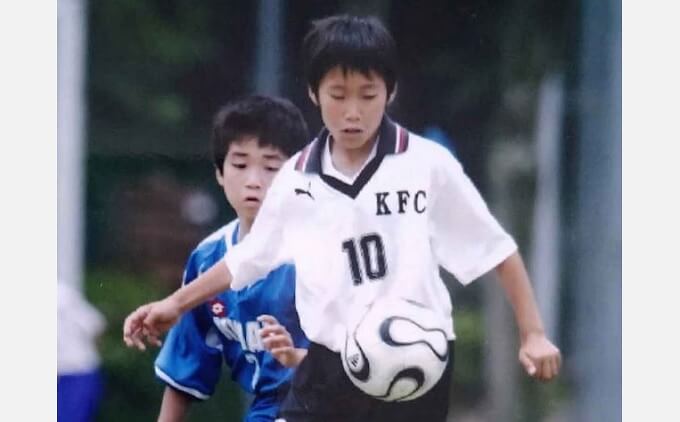
When he entered junior high school, he lived with his grandmother in Osaka and spent his days going to team practice after school. It took time for him to adjust to the new environment and school life. He also suffered repeated injuries, including a broken arm in his first year of junior high school and a broken hip in his third year. In addition, he grew from about 5'5 tall to 5'9" in three years. His muscles could not keep up with his growth, and he fell into a "clumsy" condition that prevented him from playing the way he wanted to.
His father, at the time, always drove several hours on weekends to watch Daichi's matches. From his father's perspective, Daichi's movements seemed to be in slow motion. In the car that his father drove after one of the games, Daichi cried out, "When is my body going to move properly? Trying to cheer up the depressed Daichi, his father said, "Keep working hard to make your soccer dream come true!" he said. Then Daichi said, "Soccer is a means, not a dream. I put my mom and dad through a lot of trouble so that I can continue to play soccer. Soccer is the only way for me to give back more than I normally would." In other words, soccer was not only his favorite sport, but also a way to give back. His father was very surprised to hear these words.
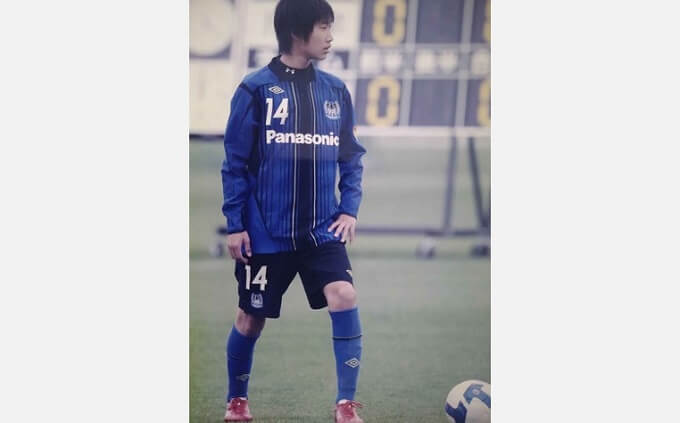
Despite the tough days, Daichi did not lose his passion for soccer. However, to become a professional at Gamba Osaka, he had to be the first or second best player of his generation. In his same grade was Yosuke Ideguchi (playing for Celtic in 2022-2023), and in the generation below him was Ritsu Doan (playing for Freiburg as of 2024). Therefore, in his third year of junior high school, both he and his family thought it would be better for him to continue playing soccer in the high school club and go up to the professional level. Eventually, the team told him that promotion from junior youth to youth was not possible, and he decided to go on to Higashiyama High School in Kyoto, Japan.
Coincidentally, Higashiyama High School coach Fukushige was one year his father's junior in college. When Fukushige saw Daichi play for the first time, he decided to teach him hard work and fighting rather than skill and sense. And so, when Daichi became a high school student, he began waking up at 5:00 a.m. to catch the first train to school for morning practice, practicing on his own after club practice, and returning home at 23:00 at night. Daichi spoke of those days with a half-smile on his face. "At that time, I was already influenced by manga and anime, and I was doing some weird training. I would run all the time on the beach with weights on both hands and feet, or dribble repeatedly on 10 chairs in the school hallway. I don't think that training makes much sense now."
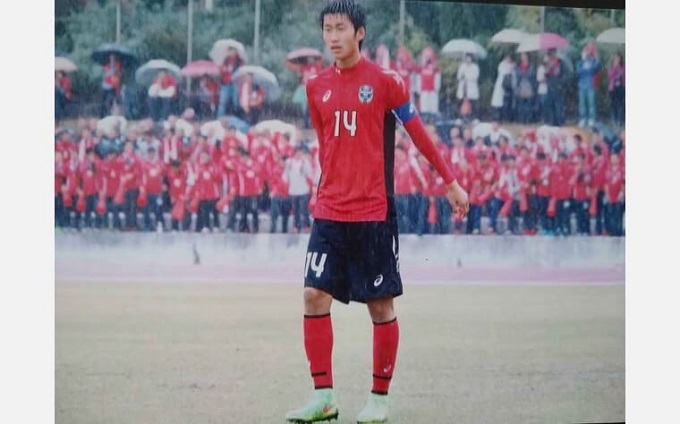
Daichi was such a practice bug that he became a regular in his first year of high school. He also played in the second half of the Kyoto tournament final. In additional time, when the team was down by one goal, Daichi received an exquisite pass in front of the goal, but he missed the shot. When the final whistle sounded, he let out a loud cry and shed a large tear.
Manager Fukushige looked back fondly on the scene: "Daichi came out in the middle of the game and changed the flow of the game. His final shot was the kind of ball that would go in if you just touched it. Even I, on the bench, thought it had been decided," he said with a wry smile. No one blamed Daichi for his mistake, and the seniors thanked him after the game and told him that they expected him to be active next year and beyond. Daichi, however, had his head cut off later that day. He must have been filled with regret, remorse, new determination, and many other emotions.
Daichi continued to practice hard. He took both the top scorer and top assists in a league tournament for his age group, which included high school students. Still, he was not nationally famous, but he was approached by Sagan Tosu, a J1 team. One of Sagan Tosu's scouts at the time thought highly of Daichi. Daichi later recalled, "Sagan Tosu picked me up when I was in high school. Only Sagan Tosu approached me, and I am very grateful. In my first year, the coach Morishita took care of me patiently, as I was a little brat, and was very helpful to me. If it weren't for Mr. Morishita, I certainly wouldn't be where I am today."
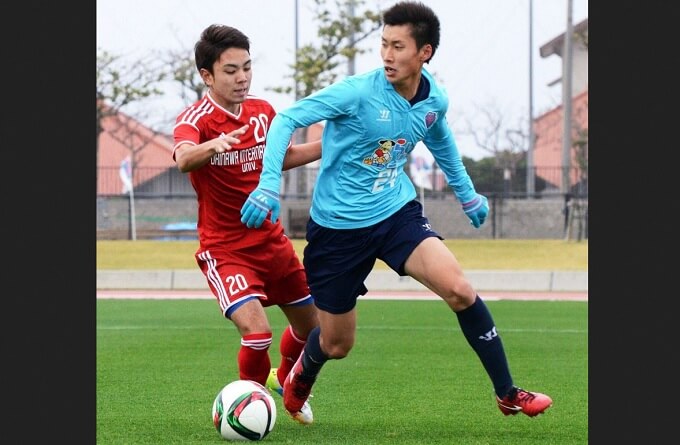
Morishita, the manager at the time, gave 18-year-old Daichi his professional debut as soon as he joined the team. Morishita actively used Daichi, a rookie, from the pre-season camp, and three months after the start of the 2015 J-League season, he used him in an official match.
Morishita spoke of that time, "I had no doubts about using Daichi in games. I thought he was a very interesting player as we had a lot of training matches in camp. At the time, the team needed to evolve from the previous coach's style, and we decided to make use of Daichi. He made a through pass of about 30 meters in the first play of his debut match, and he also scored with a mid-range shot. I was convinced then that I was right, and once again I thought he was terrific."
Daichi scored three goals in his rookie year and was a candidate for Japan's U-22 national team for the Rio de Janeiro Olympics. Off the field in his first year, when he was 19 years old, he had a chance to transfer within Japan, but he stayed with Sagan Tosu and waited for offers from abroad. He was surely motivated by his love for the team that had picked him up.
Then, in 2017, three years after Daichi joined the team, he moved from Tosu to Frankfurt. He also moved to Sint-Troiden for a limited time, but returned to Frankfurt in 2019. In that year he scored a total of 10 goals in official matches. He then moved to SS Lazio in 2023 and as of 2024 he is playing for Crystal Palace FC.
By the way, Daichi has given back to his parents as he told his father when he was in junior high school. When his contract was renewed at the end of his first year as a professional, he gave his parents a pair of luxury wristwatches along with a letter of thanks. For his younger brother, who followed Daichi in signing a professional contract, he gave him a car. And in his fourth year at Frankfurt, he gave his parents a newly built seven-room house.
sources
- Kota Takai's early life
- Ao Tanaka's early life
- Ayase Ueda's early life
- Daizen Maeda's early life
- Daichi Kamada's early life
- Kaoru Mitoma's early life
- Reo Hatate's early life
- Ritsu Doan's early life
- Takefusa Kubo's early life
- Takehiro Tomiyasu's early life
- Takumi Minamino's early life
- Wataru Endo's early life
